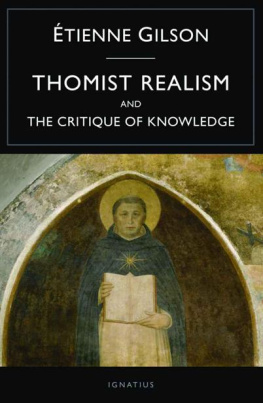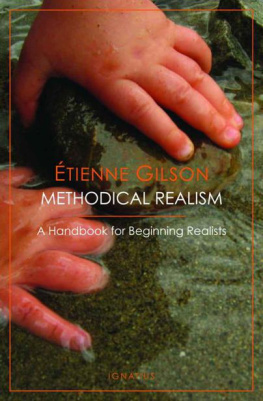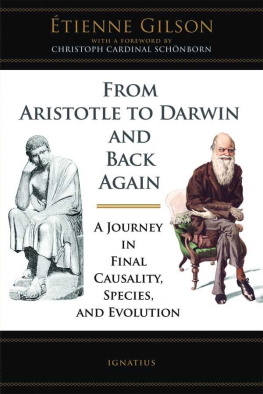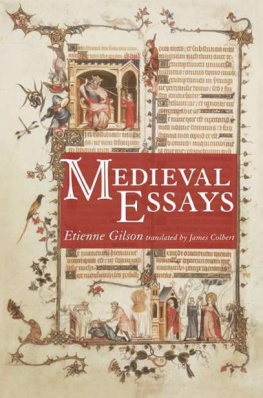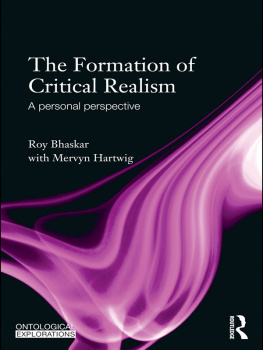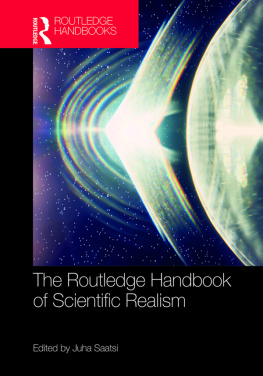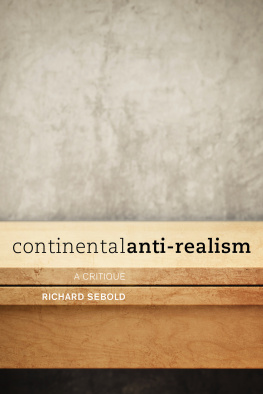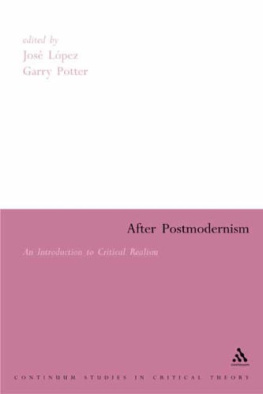THOMIST REALISM
AND THE
CRITIQUE OF KNOWLEDGE
ETIENNE GILSON
THOMIST REALISISM
AND THE
CRITIQUE OF KNOWLEDGE
TRANSLATED BY MARK A. WAUCK
IGNATIUS PRESS SAN FRANCISCO
Title of the French original:
Ralisme thomiste et critique
de la connaissance
1939, 1983 Librairie Philosophique J. Vrin
Paris, France
http://www.vrin.fr
Cover image:
Saint Thomas Aquinas
Fra Angelico (1387-1455)
1440-1442. Mural, 108 x 145 cm.
Museo di S. Marco, Florence, Italy
Erich Lessing / Art Resource, New York
Cover design by Roxanne Mei Lum
Republished in 2012 by Ignatius Press
1986 by Ignatius Press, San Francisco
All rights reserved
ISBN 978-1-58617-685-3
Library of Congress Control Number
Printed in the United States of America
CONTENTS
FOREWORD
When two or more independent insights cross a new philosophy is born. Etienne Gilson would probably have approved of this sage observation of his teacher, Henri Bergson, but he might have denied that the dictum applied to his own life. Insistent throughout his career that he was first and foremost an historian of philosophy, Gilson understood his task to be one of restoration, restoration of an imperfectly understood medieval tradition of Christian thought, but principally the restoration of the wisdom of the Common Doctor of the Church, St. Thomas Aquinas. Nonetheless, this lifelong task involved Gilson in forging a strikingly original synthesis, one crafted in the catalyst of that history of philosophy to which he gave so lovingly his genius and his amazing erudition.
If existence is the unity in which all essences are annealed in being, as Gilsons master, Aquinas, taught, then the very existence of Gilsons personal philosophical synthesis was fashioned principally by three distinct convictions. Any one of them would have made Gilson a formidable figure in twentieth-century thought, but the unity of the three made Gilson, in my judgment, the most striking single figure in Catholic thought in this century. Gilsons first conviction was his insistence that there exists in fact a philosophical tradition that must be denominated Christian because it grew within and was nourished by the Catholic faith. From being to possibility is a valid inference, and hence any abstract isolation of philosophy from Christianity is a futile exercise in misplaced logic. Christian philosophy exists, and when we study it historically we discover a body of teaching vastly superior to its classical antecedents and to its modern successors.
The test, Gilson insisted, was the reality of history itself. That Christian philosophy is a dubious concept, as Gilsons adversaries have argued, is a pretension easily countered by his own insistence that concepts must be measured by reality and not the other way around. Gilsons profound Aristotelian realism exercised in his long critique against Cartesian rationalism found here a striking illustration of its epistemological power. By their fruits ye shall know them! Let those who deny that philosophy can be Christian explain away a millenium of speculation which simply would never have been had Christendom not existed.
To the reality of the history of Christian philosophy can be added Gilsons second affirmation: that the critical problem from which rationalism and idealism emerged was never posed by St. Thomas Aquinas because his realism rendered the so-called problem of knowledge at best superfluous and at worst a betrayal of the first principles of Thomistic realism. Whether philosophy, especially first philosophy or metaphysics, ought to begin with a critique of knowledge or not is a logically coherent question, but it cannot be answered in the affirmative by men claiming to speak in the name of St. Thomas Aquinas. History, once again history, instructs us that the same Aquinas did not begin to philosophize as though he were a post-Cartesian. Aquinas did not commence with a universal doubt concerning the capacity of human intelligence to know the real not because St. Thomas did not know Descartes but because any variant on the universal doubt as well as the doubt itself cancels the first principles of metaphysical or Thomistic realism.
If the immediate evidence of sensation, penetrated by the intellect, yields a universe of things existing in independence of our knowing them, then the Thomistic realism of the fact of existence opens the gate to the Thomistic metaphysics of the primacy of the act of existing in being. Delineated somewhat hesitantly in God and Philosophy , Gilsons rediscovery of the central role of existence in St. Thomas was first hammered home in the chapter Existence and Reality added to the fifth edition of his Le Thomisme . These insights were expanded brilliantly in his monumental Being and Some Philosophers and later were recapitulated in his shorter The Spirit of Thomism . It should come as no surprise that history orchestrated this finale to Etienne Gilsons metaphysical synthesis. The book of Exodus is not a metaphysics: it is the revealed Word of God. But although not a metaphysics, Exodus is an invitation to reasonable men to fashion a metaphysics of the Name of God. If the Name of God is Being, I Am Who Am, then to create means to make things be. Their very existence is the core of their being, that without which they would be nothing. The central importance of esse in the full sweep of St. Thomas thought seemed to have been missed, although never quite denied, by the majority of Aquinas most illustrious commentators. Gilson often puzzled over this curious anomaly and Gilsons discovery reminds me of Chestertons definition of paradox: you must suddenly begin to see white on black for the first time after having seen black on white all your life.
The metaphysics of being as existence crowned Gilsons earlier insistence on the reality of Christian philosophy. Here we find a perfectly rational doctrine, indeedinsist its supportersthe only fully rational doctrine about being, which was primed by the historical revelation of God to Moses. Both the Christian origin of the teaching and the preeminent role granted existence in turn bend back and support the immediate realism of Aquinas, a realism beginning with the truth that things are and that I know them to be because I sense and perceive them. The touchstone of existence is, as the innocent pun suggests, sensation. In knowing immediately that which is, man knows the effect of him who simply Is. This truth man does not know immediately: he must prove it by process of subsequent reasoning, but a reasoning that takes its point of departure from a world of material things that is later known to be Gods creation. Whether we could have known all this outside the context of Christian history is an unreal question because in fact we have known this wisdom only within that history. Nobody outside Christianity has known it at all. Gilson often seemed slightly impatient with adversaries who could not see what appeared to him to be clairvoyantly evident. In their defense we should point out that Gilson spent many years in careful research and original speculation before discovering what, once discovered, then seemed to him to be obvious. He ended where he began: with what the catechism taught him as a child.
The appearance of this English translation of Etienne Gilsons Ralisme thomiste et critique de la connaissance by Mr. Mark Wauck closes what has certainly been the most significant gap in the corpus of Gilsons writings published in English. At the risk of offending enthusiasts of Gilson who might be fond of this or that book in French which has not found its way into English, I suggestalong with Mr. Wauckthat Thomist Realism and the Critique of Knowledge has been the Gilson work whose availability in English has been most sorely missed. Written as a definitive answer to those philosophers who sought to reconcile critical philosophy with scholastic realism, it is the groundwork for the later works in which Gilson plumbed the depths of St. Thomas teaching on existence and judgment. Having firmly established a realism of knowledge, thus freeing realism from the excess critical baggage with which it had been burdened, in the final chapter he began his metaphysical journey to the heart of reality, the act of existence. It is no coincidence that Ralisme thomiste preceded Being and Some Philosophers , for it was during his historical study of the various critical realisms then current that Gilson became increasingly aware that a faulty understanding of the word existence was the cause for so much of the philosophical wreckage on the stage of history. Time and again Gilson had turned to history to deepen his understanding of existence, and in Ralisme thomiste history became the crucible in which his timeless insights into Thomist metaphysics were tempered. In Being and Some Philosophers those insights received their mature expression. No serious student of either St. Thomas or Etienne Gilson can afford to impoverish himself by not mastering the book here being introduced.
Next page
